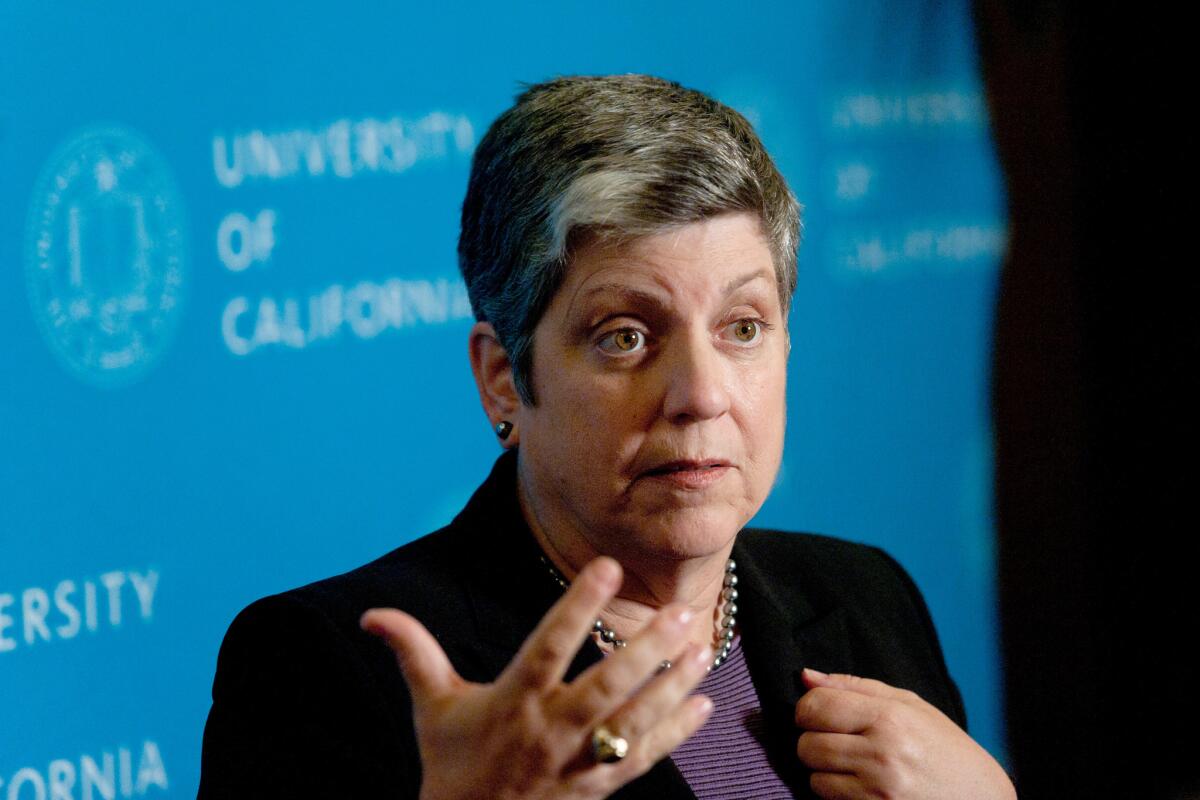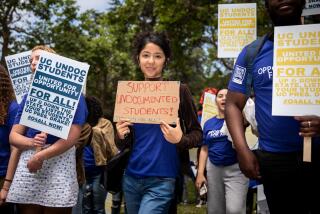UC president will examine enrollment levels of non-California students

As she marks her first anniversary as UC system president, Janet Napolitano on Tuesday said she wants to tackle the controversial issue of whether some of the nine undergraduate UC campuses are enrolling too many students from other states and countries.
Napolitano said she and the campus chancellors in the next few months would study “what is the right balance of out-of-state and international enrollment.”
The numbers of non-Californians at UCLA and UC Berkeley, in particular, “may be at about as maximum as they can be,” she said in an interview with The Times. But she said it was premature to discuss specific ceilings on such enrollments until the study was finished.
The number of students from outside California and the United States is expected to rise to more than 20% of freshmen this fall, according to UC data. These students, who pay extra tuition, are aggressively recruited by UC.
Among the campuses, the highest percentages of the freshman classes are at UCLA, 30.1%; UC Berkeley, 29.8%; and UC San Diego, 28.4%. About 13% of all UC undergraduates are non-Californians, Napolitano said.
However, Napolitano, who is the former U.S. secretary of Homeland Security and former governor of Arizona, insisted that Californians were not being pushed out to make room for those students.
The $23,000 that the non-Californians must pay in addition to the regular $12,192 tuition helps support classes and financial aid for California students as state funding for UC has not kept up with Californians’ enrollment growth, she said.
Napolitano said she hoped that concerns about the issue among UC applicants, parents and legislators would result in increased state revenue for UC. “I hope it prompts leadership around the state to say, ‘Hey, if we want more California students admitted, we need to pay for that.’ ”
The UC regents are expected in November to start discussing the 2015-16 budget for the 10-campus system, including the possiblity of a tuition increase after three years of freezes. The university faces higher pension and benefits costs, among other expenses, and that cannot be handled wholly by cutting other spending if state funding does not rise enough, Napolitano said.
She said she had not made any decision about seeking a tuition increase but said: “It’s fair to say that nothing right now is off the table.”
For her second year at UC, Napolitano said she wanted “to really focus on filling in and implementing a lot of the initiatives started in year one.”
In her first year, Napolitano helped usher in a new era of labor peace, with the settlement of major union contracts for employees at the campuses and medical centers. She also moved to establish new policies on the prevention and handling of sexual assaults, expanded UC research on sustainable agriculture and easing world hunger and strengthened relationships with universities in Mexico.
In addition, she has pushed UC to garner more income from faculty inventions, with more direct investments in start-up companies. She increased financial aid and services for students who entered the country illegally, a hot issue since critics contended that policies she oversaw at Homeland Security increased deportations.
Another priority, she said, will be hiring more faculty and retaining current professors. While state funding support remains below what it was before the recession, “at least the slash and burn time is over and we now can focus on some of those things we were really not able to address in the recession.”
Follow me @larrygordonlat.
More to Read
Sign up for Essential California
The most important California stories and recommendations in your inbox every morning.
You may occasionally receive promotional content from the Los Angeles Times.











